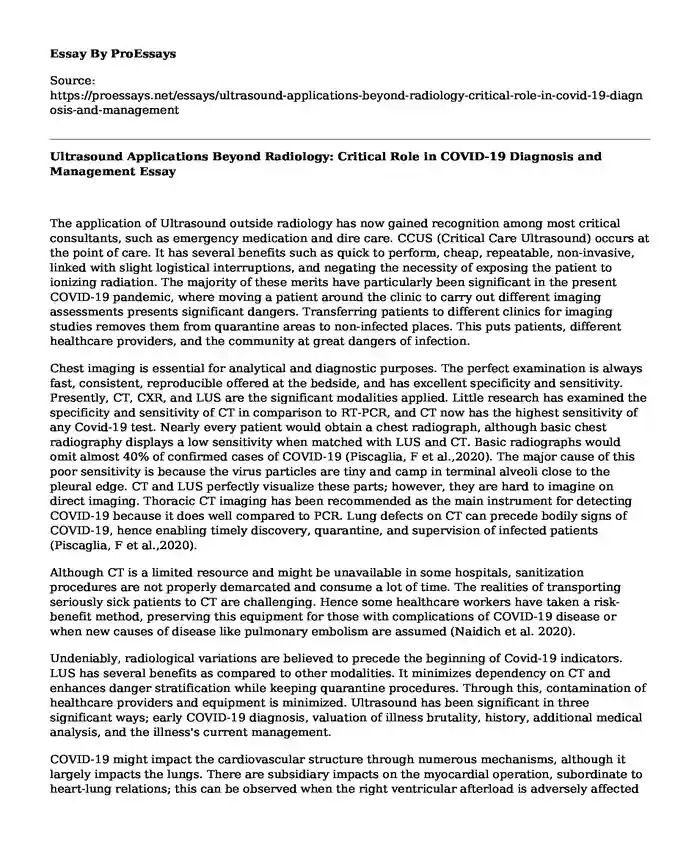The application of Ultrasound outside radiology has now gained recognition among most critical consultants, such as emergency medication and dire care. CCUS (Critical Care Ultrasound) occurs at the point of care. It has several benefits such as quick to perform, cheap, repeatable, non-invasive, linked with slight logistical interruptions, and negating the necessity of exposing the patient to ionizing radiation. The majority of these merits have particularly been significant in the present COVID-19 pandemic, where moving a patient around the clinic to carry out different imaging assessments presents significant dangers. Transferring patients to different clinics for imaging studies removes them from quarantine areas to non-infected places. This puts patients, different healthcare providers, and the community at great dangers of infection.
Chest imaging is essential for analytical and diagnostic purposes. The perfect examination is always fast, consistent, reproducible offered at the bedside, and has excellent specificity and sensitivity. Presently, CT, CXR, and LUS are the significant modalities applied. Little research has examined the specificity and sensitivity of CT in comparison to RT-PCR, and CT now has the highest sensitivity of any Covid-19 test. Nearly every patient would obtain a chest radiograph, although basic chest radiography displays a low sensitivity when matched with LUS and CT. Basic radiographs would omit almost 40% of confirmed cases of COVID-19 (Piscaglia, F et al.,2020). The major cause of this poor sensitivity is because the virus particles are tiny and camp in terminal alveoli close to the pleural edge. CT and LUS perfectly visualize these parts; however, they are hard to imagine on direct imaging. Thoracic CT imaging has been recommended as the main instrument for detecting COVID-19 because it does well compared to PCR. Lung defects on CT can precede bodily signs of COVID-19, hence enabling timely discovery, quarantine, and supervision of infected patients (Piscaglia, F et al.,2020).
Although CT is a limited resource and might be unavailable in some hospitals, sanitization procedures are not properly demarcated and consume a lot of time. The realities of transporting seriously sick patients to CT are challenging. Hence some healthcare workers have taken a risk-benefit method, preserving this equipment for those with complications of COVID-19 disease or when new causes of disease like pulmonary embolism are assumed (Naidich et al. 2020).
Undeniably, radiological variations are believed to precede the beginning of Covid-19 indicators. LUS has several benefits as compared to other modalities. It minimizes dependency on CT and enhances danger stratification while keeping quarantine procedures. Through this, contamination of healthcare providers and equipment is minimized. Ultrasound has been significant in three significant ways; early COVID-19 diagnosis, valuation of illness brutality, history, additional medical analysis, and the illness's current management.
COVID-19 might impact the cardiovascular structure through numerous mechanisms, although it largely impacts the lungs. There are subsidiary impacts on the myocardial operation, subordinate to heart-lung relations; this can be observed when the right ventricular afterload is adversely affected by high PEEP (Mento, F. et al.,2020). Similarly, there are direct cardio-lethal pathological impacts; the virus has been secluded from myocardial muscle in case accounts (Mento, F. et al. 2020). This has been anecdotally displayed as a serious worsening 7-10 days into the progression of the disease. The series of cases appear to be in keeping with a general hyper-inflammatory procedure, with a similar increase in lab biomarkers like D-dimers, ferritin, CPR, and many others. Radiology procedures prepare to reduce the effect of the COVID-19 epidemic on imaging case capacities and commence formulating change strategies in the recovery time.
References
Mento, F., Perrone, T., Macioce, V. N., Tursi, F., Buonsenso, D., Torri, E., ... & Demi, L. (2020). On the Impact of Different Lung Ultrasound Imaging Protocols in the Evaluation of Patients Affected by Coronavirus Disease 2019: How Many Acquisitions Are Needed? Journal of Ultrasound in Medicine.
Naidich, J. J., Boltyenkov, A., Wang, J. J., Chusid, J., Hughes, D., & Sanelli, P. C. (2020). Coronavirus Disease 2019 (COVID-19) Pandemic Shifts Inpatient Imaging Utilization. Journal of the American College of Radiology, 17(10), 1289-1298.
Piscaglia, F., Stefanini, F., Cantisani, V., Sidhu, P. S., Barr, R., Berzigotti, A., ... & Huang, P. (2020). Benefits, Open questions, and Challenges of the use of Ultrasound in the COVID-19 pandemic era. The views of a panel of worldwide international experts. Ultraschall Med.
Cite this page
Ultrasound Applications Beyond Radiology: Critical Role in COVID-19 Diagnosis and Management. (2024, Jan 29). Retrieved from https://proessays.net/essays/ultrasound-applications-beyond-radiology-critical-role-in-covid-19-diagnosis-and-management
If you are the original author of this essay and no longer wish to have it published on the ProEssays website, please click below to request its removal:
- The Immortal Life of Henrietta Lacks
- Paper Example on Perception and Individual Decision Making
- A Policy for the Americans With Disabilities Act (ADA) Essay
- Teenage Pregnancy: Social, Economic & HIV Risks - Essay Sample
- Leadership & Followership: Keys to Success in Organizations - Essay Sample
- Essay Example on Effectively Harnessing Team Collaboration for IT Management
- Free Paper Example: Perioperative Service Enhancement







